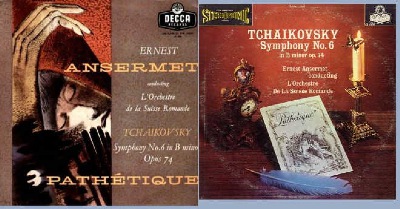 | 
Peter Tschaikowsky, sa symphonie No 6 en si mineur Opus 74
C'est la seule symphonie de Tschaikowsky qu'Ernest Ansermet a enregistré pour le disque, certainement parce que c'est la plus populaire des symphonies de Tschaikowsky. Les séances d'enregistrement se sont situées entre les 17 et 30 octobre 1956, au Victoria-Hall de Genève (Pr: James Walker Eng: Gil Went (m), James Brown (s)). L'enregistrement monophonique est sorti en mai 1957 sur Decca LXT 5306 et London LL 1633, en stéréophonie toutefois seulement deux ans plus tard, en novembre 1959 sur CS 6108, réédité entre autres en février 1973 sur SPA 221. Et il faut attendre jusqu'au mois d'avril 2009 pour en voir la première sortie sur CD, bien entendu chez Decca Australie dans leur série Éloquence (voir la référence cpmplète plus bas sur cette page).
Un extrait de la critique de l'époque - de la revue Gramophone - lors de la parution du LXT 5306:
Je profite de l'occasion pour souligner le travail remarquable de la revue Gramophone, qui met ses archives en libre disposition sur la toile.
"[...] Ansermet, as we would expect, holds our attention with his reading, and the chief limitation on his performance is the fact that the orchestra is not always quite up to the virtuoso nature of the reading.
Ansermet secures very expressive phrasing from his violas, especially in the descending phrase at the close of the first paragraph, and the ascending one which closes the first subject-group. More than most conductors, he makes the three statements of the second subject sound quite different in emotion: as of a joy and consolation hesitantly accepted (muted strings), unashamedly welcomed (unmuted strings), and then tenderly considered (clarinet solo). The development section cracks in with exciting effect. The narrow-toned brass is fiery here, and very well recorded. Deliberately, the conductor has stressed the episodic, erratic nature of the movement, as expression of the composer's darting, melancholy mind.
But the 5/4 Allegro is held very tight, driven on with an unflinching beat that sometimes seems at variance with the con grazia qualification of the tempo-indication. It makes one feel rather giddy. In the March-Scherzo one senses that the orchestra is not really on top of this music - at any rate in this fleet crisp reading; and in the crescendo up to the enunciation of the March proper, the brass does not sound its dotted motif with anything like the requisite distinctness. The last movement seems a little too restrained in expression; and the final pizzicato B's from the double-basses emerge as dry bumps.
This is, then, never less than an interesting performance. What we miss chiefly is that quick, nervous line which, in the Leningrad Philharmonic's recording (*), makes the Symphony sound so unusually expressive and meaningful. Praise to Decca for an imaginative cover, an adaptation of the lithograph which Barnett Freedman drew to decorate the "Of the inward senses" passage of Burton's Anatomy of Melancholy. Though this was originally intended for six-colour printing, and has been much falsified in colour on the sleeve, it still makes a striking and appropriate design. A.P. [...]" (cité d'après http://www.gramophone.net/Issue/Page/June%201957/14/823962)
(*) Avec le "Leningrad Philarmonic" il s'agit de l'enregistrement légendaire de Mravinsky, DGM 18334, 02/1957.
Voici donc...
Peter Tschaikowsky, Symphonie Nr. 6 in h-moll, Op. 74, Orchestre de la Suisse Romande, Ernest Ansermet, octobre 1956, Victoria-Hall, Genève (1. Adagio - Allegro non troppo 18:12:000, 2. Allegro con grazia 07:05:000, 3. Allegro molto vivace 08:48:000, 4. Finale. Adagio lamentoso - Andante 09:48:000)
... que je vous offre, vous pouvez l'obtenir tout simplement en...
______________________________CLIQUANT_ICI______________________________
pour obtenir le premier fichier ZIP contenant les deux fichiers FLAC des 1er et 2e mouvements sindi qu'un court fichier TXT, et en...
______________________________CLIQUANT_ICI______________________________
pour obtenir le deuxième fichier ZIP contenant les deux fichiers FLAC des 3e et 4e mouvements, ainsi qu'un court fichier TXT.
120 et 87 MB, Decca 6.42148 AF -> WAV -> léger "ClickRepair" -> FLAC
Ce disque a obtenu le Grand Prix du Disque.
Disponibilité actuelle (janvier 2010) sur CD: Decca Australie dans sa série Éloquence, double CD 480 0563 contenant le Lac des Cygnes dans une version abrégée, les Variations sur un thème Rococo - avec Maurice Gendron - et cette symphonie No. 6. Voir par exemple http://www.buywell.com/cgi-bin/buywellic2/efly.html?mv_arg=13038
 Les images de couverture des premières éditions Decca LXT 5306 (mono) et London CS 6108 (stéréo) Les images de couverture des premières éditions Decca LXT 5306 (mono) et London CS 6108 (stéréo)
|  |

